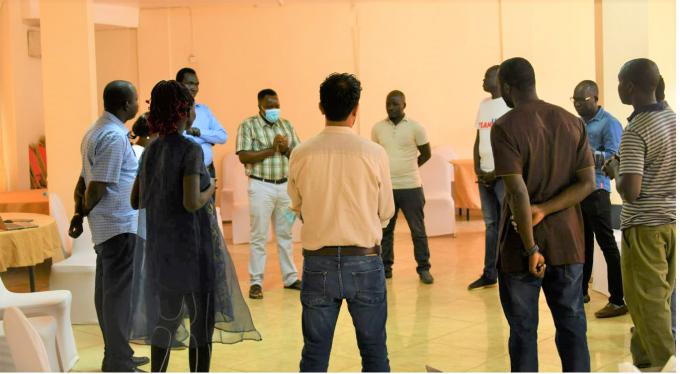TeamUp partners share notes to help children overcome effects of conflicts
TeamUp Consortium members during interactive session in Juba. Picture//Save the Children
Facilitating child-friendly sessions that makes them feel safe, heard and respected continue to be the cornerstone of TeamUp’ psychosocial support to children affected by war and conflicts in South Sudan.
The project focuses on mental health and child protection services through localized children’s games and activities, while creating awareness among parents and communities in order to build resiliency.
TeamUp Consortium members; Save the Children, War Child Holland, Help a Child, SoS Children's Villages International provide psychosocial support and protection services to counter the impact of conflicts on children aged 6-18.
The members met in Juba on Monday, March 21, 2022 to evaluate and exchange notes on the successes of the project thus far.
“TeamUp Mental Health and Psychosocial Support Services (MHPSS) is an inclusive psychosocial intervention that helps reduce tension, trauma and improve emotional and psychological wellbeing of children,” said Mark Hatany, TeamUp Coalition Coordinator, Save the Children.
Some of the simpler things that TeamUp addresses through the active participation of children during games include anger -as affirmed by Joyce Keji, Resilience and Participation Assistant, Save the Children.
“There are children who come for these activities and games -at first - with too much anger. Some of them are unable to interact with others well, they are reserved. But as the games progress, you see them laughing, having fun and making friends. This is why TeamUp exists to create harmony and friendship among children whose background have been traumatized by wars and conflicts. And this is what we have been able to do in places like Maban Refugee camp where children from Sudan, Ethiopia and South Sudanese local communities are able to get along.”
Save the children and partners actively engages children, parents, and community members through child-friendly and non-verbal modalities to allow all children to participate in Maban and Bor.
There are trained facilitators and volunteers who support child friendly sessions in areas of the project implementation. The facilitators' role is to guide children during playtime. Some of the facilitators include teachers.
In order to strengthen community participation around issues affecting children, monthly meetings are organized with local authorities, community representatives and education officials to seek their feedback on initial stages, including the selection of children.
“It is very important to integrate TeamUp activities into school curriculum such as during Pysical Exercise [PE] classes to ensure its sustainability and building resilience among the communities,” Mark emphasized.
Currently, Save the Children, War Child Holland and local partners are documenting initial outcomes and sharing experiences during relevant cluster meetings, Technical Working Groups, and state and national MHPSS and Child protection coordination groups. They will also use learnings from this project to inform and complement other MHPSS programming in South Sudan, including in the South Sudan Joint Response 2022-2023. This will also help in the identification of children needing referrals to MHPSS level 2 or higher-level interventions or other protection services.
TeamUp project to reach 1,000,000 children by 2025 and to be integrated in MHPSS minimum service package for the humanitarian sector and childprotection interventions in the SSJR.
About TeamUp
The TeamUp intervention was piloted and rolled out for children affected by conflicts in different settings, including refugee settlement, community spaces and schools.
Save the Children, War Child and UNICEF Netherlands jointly developed the robust methodology that drives the global implementation of TeamUp. The intervention adapts a non-verbal modality with play and movement-based activities to address four key principles: to establish a sense of security; promote social connectedness; increase self-regulation; and foster a positive outlook on life. These principles are embedded throughout the TeamUp intervention - and serve to support the psychosocial wellbeing and contribute to the resilience of children who take part in TeamUp.
Story by: Daniel Danis/Save the Children
 South Sudan
South Sudan 